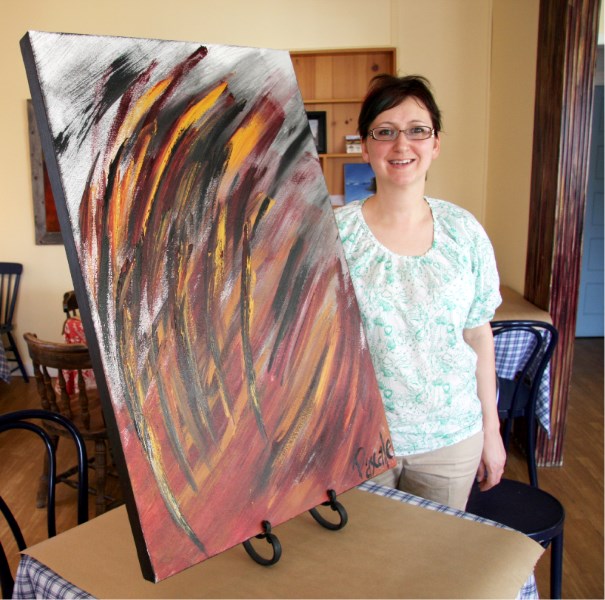For Pascale Proteau, painting has been a method of baring her soul to herself. It has helped her understand and cope with her past, and served as an important type of therapy.
While many artists attack their work with an emotional investment, and strive to convey emotion in what they create, it goes a little deeper for the Bonnyville coffee shop proprietor, who suffered from post-traumatic stress disorder resulting from her abusive childhood.
“Art is a safe and nurturing way to deal with emotions,” Proteau explains while seated in the sunny front serving area of her 50th Avenue shop, Café Impromptu.
“It's almost as if you communicate with your inner self, or your self-conscious.”
That's particularly true of expressive art, which café patrons will have a chance to view being created live next week in the restaurant.
The focus on art as expressive therapy is running in conjunction with Mental Health Week, from May 3 to 9.
Each day starting Tuesday, the café will feature artists painting live from 11 a.m. to 2 p.m., either inside or outside, weather permitting.
While the artists and their work will undoubtedly attract attention, some other touches in the restaurant will also bring about awareness of mental health issues — things such as placemats with mental health facts.
It's all part of Proteau's efforts to promote mental health awareness, reduce the stigma attached to seeking help for mental health problems, and encourage people to pay attention to their minds as well as their bodies.
A reluctance to seek help for ailments such as depression can lead to a decline in a person's mental and physical health, she notes. In Proteau's case, her PTSD showed up initially in symptoms that made her doctor think she may be suffering from multiple sclerosis or the effects of a stroke. She eventually was treated for PTSD, and her art has been part of the therapy package.
“It gives you quite a bit of insight into how you've been feeling,” Proteau explains, adding the benefit to her has come in the emotion expressed in the creative process, not what ultimately ends up on canvas.
“It's about the process, not the result,” she says.
While Proteau's work has been publicly displayed before, her expressive pieces that were a significant part of her therapy — ones that carry names strong names such as Rage and Flight — will be displayed publicly for the first time during Mental Health Week.
Like Proteau, Roxanne Charbonneau, mental health promotion facilitator with Alberta Health Services in St. Paul, sees value in art as therapy.
“Art as a creative outlet can assist those with mental health issues in their recovery by teaching and identifying artistic abilities,” she says.
She also sees mental health as something that requires upkeep and maintenance.
“Just like our physical health, keeping up our mental health is important. One of the most effective ways to have mental health is to stay connected and be supported by our family, workplace and community. By taking time to support others we are helping to create an environment which promotes mental health and prevents mental illness.”
And when you're struggling? Proteau offers some insight based on her personal experience.
Don't be afraid to seek professional help, she says, before adding, “People can get better. They just need the support.”



